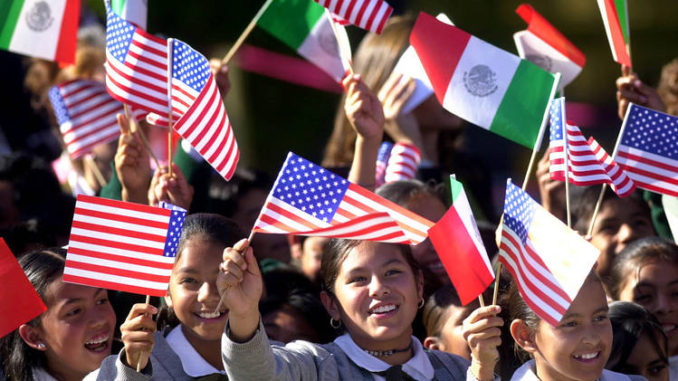
by Bret Stephens
America’s neighbor isn’t a failed state or a threat—despite what Donald Trump says.
A dozen Mexican states held elections on Sunday, and—ho-hum—the center-right National Action Party, or PAN, appears to have won seven of the races. The Journal reports that voters in the world’s 15th-largest economy were turned off by the ruling party’s failure to cut debt and tackle crime, and by a boy-wonder president, Enrique Peña Nieto, whom they now regard as more boy than wonder.
I mention this to illustrate that Mexico is a functioning democracy whose voters tend to favor pro-business conservatives, not a North American version of Libya, exporting jihad and boat people to its neighbors. Somebody ought to explain this to Republican voters, whose brains, like pickles in brine, have marinated too long in anti-Mexican nonsense.
• Mexico is a failed state. Mexico’s struggles with drug cartels—whose existence is almost entirely a function of America’s appetite for dope—are serious and well known. So are its deep-seated institutional weaknesses, especially the police forces that collude with the cartels and terrorize rural areas.
Then again, Mexico’s 2014 homicide rate of about 16 murders per 100,000 means that it is about as dangerous as Philadelphia (15.9) and considerably safer than Miami (19.2) or Atlanta (20.5). Are these “failed cities” that you don’t dare visit and that should be walled off from the rest of America?
• Mexico is a threat to U.S. security. The most serious terrorist attempt to enter the U.S. across a land border occurred in December 1999, when Ahmed Ressam tried to smuggle a bomb into the U.S. from. . . Canada. All 19 of the 9/11 hijackers entered the U.S. with legal visas on scheduled flights. The bride of the San Bernardino attacker came here the same way. No significant act of political violence against the U.S. has been staged from Mexico since Pancho Villa’s raid on Columbus, N.M., in March 1916.
Could terrorists infiltrate the U.S. by crossing the border? Sure, if they wanted to risk being asphyxiated in the back of a crowded migrant truck somewhere in Sinaloa.
As for ordinary criminals, my colleague Jason Riley has noted that the rate of incarceration in California for foreign-born residents is less than half of the U.S.-born rate. Violent crime in the U.S. fell dramatically during the same two decades, 1990-2010, of an “invasion” of illegal immigrants.
• Mexico steals U.S. jobs. Donald Trump recently resurrected this chestnut by inveighing against Nabisco and Ford for shifting production to Mexico from high-cost Illinois and Michigan. Never mind that one reason Ford made the move was to take advantage of Mexico’s free-trade agreements with the European Union and other countries, meaning that opposition to free trade is the very thing that drives business abroad.
Then again, Mexico is the second-largest purchaser of U.S. products; the Wilson Center’s Christopher Wilson has estimated that “six million U.S. jobs depend on trade with Mexico.” That is especially true for border states. “Mexico is the top export destination for five states: California, Arizona, New Mexico, Texas and New Hampshire, and is the second most important market for another 17 states across the country.”
• Illegal immigrants are a drain on the system. This whopper should be sold at Burger King, since illegal immigrants pay billions in state and local taxes, along with about $15 billion a year to Social Security—the benefits of which they are unlikely ever to get back. Entire U.S. industries, agriculture above all, depend on illegal migrants, without whom fruits and vegetables would simply rot in the field.
If there is a drain, it’s Mexicans going home—roughly one million returnees between 2009 and 2014, according to the Pew Research Center, outpacing the number of Mexicans moving north by about 140,000. That owes something to growth and stability in the Mexican economy, which is largely a function of the North American Free Trade Agreement.
This makes Mr. Trump’s opposition to Nafta all the more misjudged. Without it, Mexico could easily have become Venezuela, run by an Hugo Chávez-like strongman, that would have posed a real threat to U.S. security, as opposed to the one in Mr. Trump’s imagination.
This is a foul electoral season, one conservative voters (or their children) will look back on with political regret and personal remorse. Mr. Trump’s “Mexican” slur about federal judge Gonzalo Curiel is the most shameful word uttered by a major presidential candidate since Dixiecrat Strom Thurmond thundered in 1948 against the “Nigra race.” As in 1948, Mr. Trump is appealing to constituents who have stuffed themselves on a diet of bad statistics and misleading anecdotes—people who fancy themselves victims but behave like bigots. Republican leaders who think they can co-opt or tame Mr. Trump will instead find themselves stained by him.
Meanwhile, let’s state clearly what shouldn’t need saying but does: Americans are blessed to have Mexico as our neighbor and Hispanics as our citizens. On this point, disagreement is indecency.
